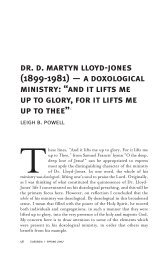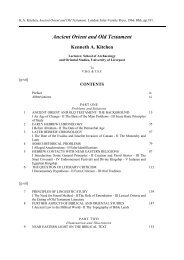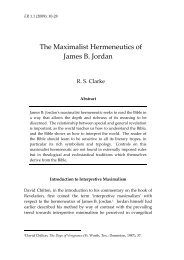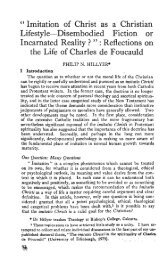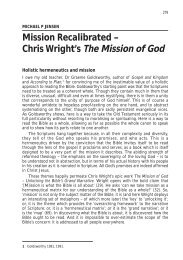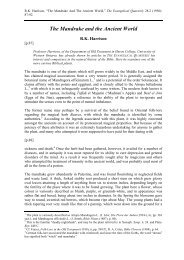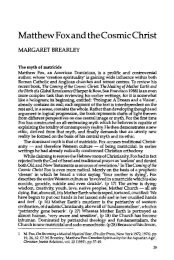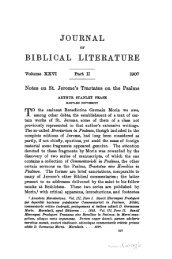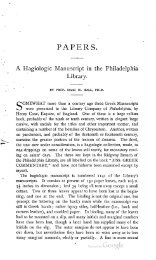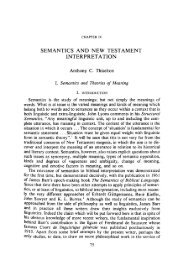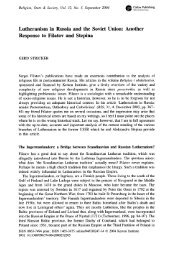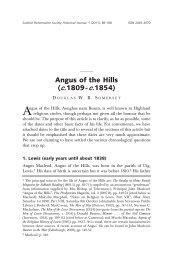The Language of the Epistle to the Hebrews as Bearing upon Its ...
The Language of the Epistle to the Hebrews as Bearing upon Its ...
The Language of the Epistle to the Hebrews as Bearing upon Its ...
Create successful ePaper yourself
Turn your PDF publications into a flip-book with our unique Google optimized e-Paper software.
LANGUAGE OF THE EPISTLE TO THE HEBREWS.<br />
I9<br />
;epev': Heb. I4 times; S. Luke, 9; S. Paul, o; all o<strong>the</strong>rs, 9; for<br />
apXEpevs, Heb. I7; S. Luke, 37; S. Paul, o; <strong>the</strong> o<strong>the</strong>r Gospels, 68,<br />
but never elsewhere. This is a remarkable fact. In view <strong>of</strong> S. Paul's<br />
arguments in <strong>the</strong> epistles <strong>to</strong> <strong>the</strong> Romans and <strong>to</strong> <strong>the</strong> Galatians, and in<br />
view <strong>of</strong> <strong>the</strong> frequency and emph<strong>as</strong>is with which he insists, in all his<br />
epistles, <strong>upon</strong> <strong>the</strong> sacrificial character <strong>of</strong> Christ's death, it seems <strong>to</strong><br />
show that his mind w<strong>as</strong> so absorbed in dwelling <strong>upon</strong> <strong>the</strong> value and<br />
power <strong>of</strong> <strong>the</strong> sacrifice that he w<strong>as</strong> not in <strong>the</strong> habit <strong>of</strong> thinking or<br />
speaking <strong>of</strong> Christ <strong>as</strong> also Himself <strong>the</strong> Sacrificer. Redemption came<br />
<strong>to</strong> his thought through <strong>the</strong> medium <strong>of</strong> <strong>the</strong> Victim by whom it w<strong>as</strong><br />
obtained, but not through that <strong>of</strong> <strong>the</strong> Priest who <strong>of</strong>fered <strong>the</strong> Victim.<br />
This is <strong>the</strong> more striking from <strong>the</strong> fact that he <strong>of</strong>ten speaks <strong>of</strong> Christ<br />
<strong>as</strong> giving Himself, <strong>of</strong>fering Himself, and <strong>the</strong> like; but always for <strong>the</strong><br />
purpose <strong>of</strong> bringing out <strong>the</strong> voluntariness and <strong>the</strong> love <strong>of</strong> <strong>the</strong> act, and<br />
never with any allusion <strong>to</strong> its priestly character. <strong>The</strong> line <strong>of</strong> re<strong>as</strong>oning<br />
in <strong>the</strong> epistle <strong>to</strong> <strong>the</strong> <strong>Hebrews</strong> w<strong>as</strong> thus quite foreign <strong>to</strong> <strong>the</strong> habitual<br />
thought <strong>of</strong> S. Paul, and <strong>the</strong>refore if, in accordance with <strong>the</strong> general<br />
conclusion <strong>of</strong> nearly all modern criticism, <strong>as</strong> well <strong>as</strong> with much <strong>of</strong><br />
ancient testimony, we reject his authorship, such similarity <strong>of</strong> language<br />
<strong>to</strong> his acknowledged writings <strong>as</strong> exists must be accounted for in some<br />
o<strong>the</strong>r way.<br />
On looking back over <strong>the</strong>se various words, with <strong>the</strong>ir difference <strong>of</strong><br />
usage, it is plain that <strong>the</strong>y are not perfectly <strong>of</strong> accord in <strong>the</strong>ir indications.<br />
This w<strong>as</strong> <strong>to</strong> be expected. I have endeavored, in this part <strong>of</strong><br />
<strong>the</strong> examination, <strong>to</strong> select only words characteristic <strong>of</strong> thought, and<br />
<strong>to</strong> note every word <strong>of</strong> this kind in regard <strong>to</strong> which <strong>the</strong>re is any considerable<br />
difference <strong>of</strong> usage; yet so many words are used by every<br />
writer accidentally, <strong>as</strong> it were, and not because <strong>the</strong>y are characteristic<br />
<strong>of</strong> his habits <strong>of</strong> thought, that much allowance is <strong>to</strong> be made. Still,<br />
<strong>the</strong> investigation seems <strong>to</strong> me <strong>to</strong> afford a sufficient b<strong>as</strong>is for some<br />
probable conclusions. I confess that I entered <strong>upon</strong> it with a prejudice.<br />
I supposed beforehand that it would result in showing Pauline<br />
thoughts and re<strong>as</strong>oning, but <strong>the</strong> phr<strong>as</strong>eology <strong>of</strong> S. Luke, and thus<br />
would confirm a very ancient and still somewhat popular hypo<strong>the</strong>sis,<br />
that <strong>the</strong> epistle w<strong>as</strong> actually written by S. Luke <strong>to</strong> express ide<strong>as</strong> and<br />
arguments received from S. Paul. <strong>The</strong> result h<strong>as</strong> been <strong>to</strong> change my<br />
views. <strong>The</strong>re are characteristic words, both style-words and thoughtwords,<br />
characteristic alike <strong>of</strong> S. Luke and S. Paul, sometimes <strong>of</strong> one,<br />
sometimes <strong>of</strong> <strong>the</strong> o<strong>the</strong>r, sometimes <strong>of</strong> both; and <strong>the</strong>se must be taken<br />
in<strong>to</strong> account in any <strong>the</strong>ory <strong>of</strong> <strong>the</strong> authorship. But <strong>the</strong>y are not more<br />
than might be expected in any writer belonging among <strong>the</strong> com-




